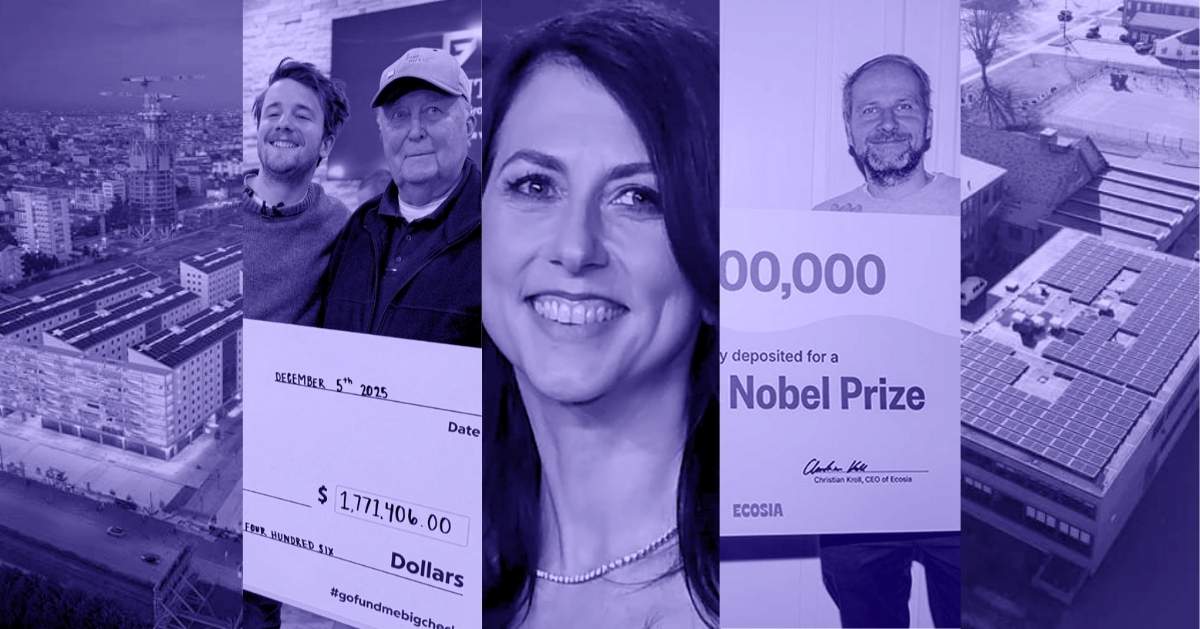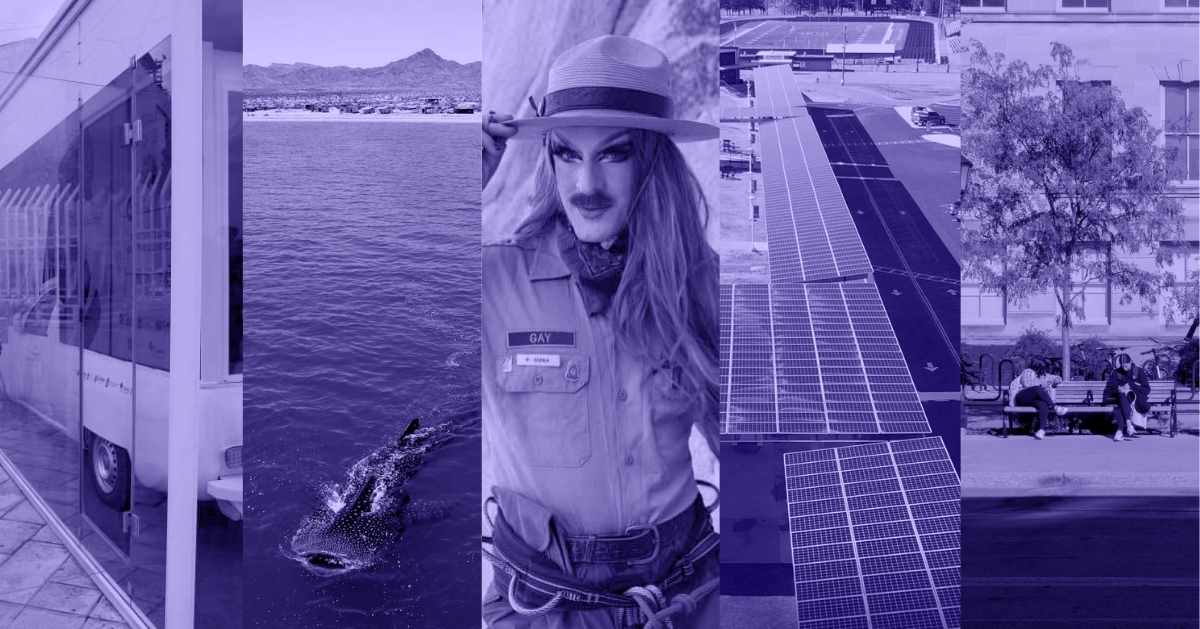Every day the Good Good Good team collects the best good news in the world and shares it with our community. Here are the highlights for this week!
If you want to get good news in your inbox every day, join the Goodnewsletter — the free daily newsletter designed to leave you feeling hopeful.
The Best Positive News We’re Celebrating This Week —
Reaching a major milestone, 10,000 women have now been certified to fight malaria in Rwanda
Malaria is the seventh leading cause of death in Rwanda, and it’s led to a widespread community effort to protect families and communities from the disease. That community effort is comprised mostly of local women caregivers, who dedicate their time and energy to treat 55% of malaria cases in the area — even more than doctors and nurses in the region.
In 2017, the Society for Family Health Rwanda and the Rwanda Ministry of Health partnered with SC Johnson and Raid to create the Certified Care program.
Certified Care provides official certification and livable wages to this unofficial community of health workers in the area, allowing them to do the work they’ve spent their lives doing, all while contributing to the efforts to eradicate malaria.
Why is this good news? Prior to the certification program, the efforts of women came at the expense of their own economic growth, as circumstances demand they prioritize these impactful community care efforts over consistent work. Certified Care changed that, giving them hope for career and economic advancement — all while helping eradicate the deadly disease.
Scientists just produced a more accurate DNA map that better reflects human diversity
Fun fact: the original human genome that was published two decades ago is mainly based on data from one single person. And while this was helpful information that informed medical research for a while — it’s long past time for an update that better reflects and represents the diversity of humanity.
That update has arrived, and scientists have just released an updated map of all human DNA. They call it the “pangenome” and it’s made up of data from 47 people from Africa, Asia, the Americas, and Europe.
The researchers believe this will transform medical research, leading to new drugs and treatments that work for a much wider range of people, and helping scientists “to better understand how genetic variation influences health and disease and moves us to a future in which genomic medicine benefits everyone.”
A florist in Nashville declined a floral design order for an RNC fundraiser event and asked the party to change gun laws
In preparation for a fundraising event in Nashville later this year, the Republican National Committee reached out to local florist FLWR Shop to provide floral design. They had a large budget — and FLWR Shop owners Alex Vaughan and Quinn Kiesow turned them down.
In a letter, which the shop also posted to Instagram, they explained why they were declining the request — that while they have conservative customers, respect their views, and believe there is room for everyone in America, the party’s stance on common sense gun legislation is “out of step with most Americans.”
They also acknowledged the recent school shooting in Nashville, “Our community has just lost seven people, including three young children, to yet another school shooting. At this moment, I cannot ignore the work that the RNC has done to create this tragedy and so many others just like it.”
FLWR Shop encouraged more people and businesses to decline business from the RNC and Republican politicians until they make meaningful changes to gun laws — which are supported by an overwhelming majority of Americans, regardless of party.
Under a new pilot program, Boston is rolling out free digital libraries at 20 bus stops across the city
Riders waiting to take the bus in Boston may notice something new at their bus stop: a sticker on the ground with a QR code they can scan to enjoy free reading material from the public library.
Twenty bus stops across the city will double as “digital libraries” where riders can borrow audiobooks, eBooks, e-newspapers, and e-magazines. The selection of free resources are meant to be read on-the-go, like poems and short stories, and include options for all ages. It doesn’t require a library card, and there’s no need to download a separate app.
Boston Mayor Michelle Wu said the initiative, which tentatively ends in August, “builds on our efforts to make public transportation more enjoyable, while also connecting our residents to the resources the Boston Public Library already offers.”
→ Read more
Why is this good news? If you’ve been around here any amount of time, you know our love for the public library runs deep. While libraries already give community members access to books and so many other services and resources, this only improves accessibility — by bringing the library right to people, right where they are!
Responding to a Nebraska senator, trans people flooded Twitter with what they wished lawmakers knew about their lives
Plain and simple: it is dangerous to live outside the gender binary in America right now. The ACLU has tracked over 460 anti-LGBTQ+ bills introduced in state legislatures across the country this year.
Nebraska Senator Megan Hunt, who was the state’s first openly LGBTQ+ state senator, and is a mother to a transgender son, has been a vocal advocate in the fight against her own state’s ban on gender-affirming care for minors.
She recently took to Twitter to ask, “Transgender friends, what do you wish lawmakers understood about what it’s like to be you?” And the responses came flooding in: lawmakers don’t need to be involved in personal medical decisions, trans people are literally just people, they have always existed, and so much more.
Why is this good news? What we need now more than ever is a deeper understanding and empathy for trans folks. Senator Hunt opening up the “floor” for trans folks to speak for themselves is an incredibly powerful way to achieve that — and we highly encourage you to take advantage of the opportunity to grow your understanding and empathy by reading their responses.
→ Read more
A beverage maker in Japan created a vending machine that captures CO2 while cooling or warming the drinks inside
In an effort to achieve carbon neutrality by 2050, one of Japan’s leading drink makers, Asahi Group Holdings Ltd. is implementing carbon capture technology in a device most of us have likely encountered: vending machines.
Asahi’s soft drinks arm created and is testing out a new type of vending machine that contains a material that can “absorb” carbon dioxide as it takes in air to cool or warm the drinks inside.
The company is starting by installing around 30 machines in part of Japan — each is expected to absorb an estimated 132 pounds of CO2 (20% of the emissions it produces) every year. It then plans to expand to a replacement program for its 260,000 total machines by 2024.
Why is this good news? Japan has around 4 million vending machines, and while that number is shrinking, they’re still very commonplace in the country. The machines dispense everything from toys to caviar, and beverage dispensing machines make up over half of the market. While capturing 20% of its emissions doesn’t seem like much — it’s significantly better than the current setup!
After her child came out, a small town Australian quickly learned how to be a good LGBTQ+ ally — and is teaching her neighbors, too
When Kirsty Brooks’ child, Xero came out to her, she was immediately supportive and didn’t question their identity or choice. Being from a smaller mining town in Western Australia with little to no LGBTQ+ representation — she did have a lack of knowledge about how to be supportive.
And she immediately sought out more information. Her first Google search led her to the website for the welcoming community of Goldfields Pride. That organization introduced her to workshops she could attend, supportive health care, and more.
She immediately got plugged in and is now working to empower other parents of LGBTQ+ young people, too. Brooks even created a local branch of PFlag, a 50-year-old organization founded to unite families of LGBTQ+ people.
We know that having supportive, affirming parents or loved ones dramatically reduces the risk of suicide among LGBTQ+ young people — so we’re celebrating not only Brooks’ efforts, but her proactivity in bringing other allies in, too!
More good news of the week —
New York City just passed a bill outlawing discrimination based on weight. More than 40% of American adults are considered obese and studies show weight stigma and bias are pervasive, leading to things like lower wages, especially for women.
Taking significant climate action, the EPA proposed first-ever emissions caps on existing power plants. The proposed rules would mark the first time the federal government has restricted carbon dioxide emissions from power plants.
The WHO just announced that mpox is no longer a global health emergency. Mostly confined to developing countries for years, mpox spread across Europe and the U.S. last year, leading to more than 87,000 cases and 140 deaths from 111 countries.
Over the weekend, mothers on six continents peacefully occupied public spaces to demand climate action to protect their children. It was another Mother’s Day campaign intended to highlight the deadly consequences of the status quo.
Illinois just passed a bill to ensure community college credits transfer to public universities. Some higher education institutions currently only count community college coursework as elective credits.
A new pancreatic cancer vaccine is showing promising results in a new trial. The vaccine uses mRNA tailored to each patient’s tumor and may have staved off the return of one of the deadliest forms of cancer in half of those who received it.
The U.S. Supreme Court used the correct name and pronouns for a transgender migrant in a recent court opinion. It feels like the bare minimum, but it really is a landmark decision by the court.
Deforestation in the Amazon is already down 40% so far this year. In April alone, deforestation dropped by 68%, a significant achievement for the country’s new president who promised to decrease deforestation.
Hundreds of students who came to Scotland as migrants will soon be eligible for free tuition. The country extended the free tuition fees in a landmark legal ruling for a migrant student who was two months shy of the prior eligibility requirement.
Striking the largest debt-for-nature deal in history, Ecuador just boosted protections for the Galápagos Islands. The deal effectively wipes out the interest on part of its debt in exchange for its protection of the islands.
Oregon is now the 10th state to ban plastic foam and PFAS in takeout containers. Starting in 2025, a new law will ban the production, sale, and distribution of polystyrene foam cups and takeout food containers — as well as toxic “forever chemicals.”
Three Minnesota Chippewa tribes will now have a stronger voice in managing the Superior National Forest. The forest and tribes made a first-of-its-kind agreement for management of land that was ceded to the federal government nearly 170 years ago.
Effective immediately, the UK has banned animal testing for chemical ingredients used exclusively in cosmetics. It had recently come to light that the UK had been issuing licenses since 2019 in certain circumstances.
The Biden Administration announced a new fund to help make low-income homes more energy-efficient. Nearly $1 billion will go to support communities that historically experienced the worst climate impacts.
An Oregon nonprofit returned 30 acres of undeveloped land near Wallowa Lake to the Nez Perce Tribe. As lake communities in the state are developed, the Wallowa Land Trust wanted to ensure the protection of this natural area — so it returned it to the tribe.



